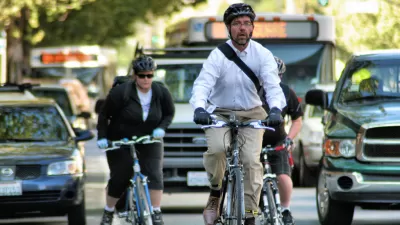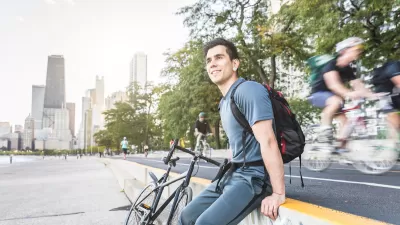Walk Score released an updated ranking of the best cities for biking—including Bike Scores for a total of 154 U.S. cities—in time for Bike to Work Week and National Bike Month.

"Minneapolis is the most bikeable city in the U.S., according to the latest ranking by Walk Score," reports a post on Redfin by Rachel Musiker (Walk Score is a Redfin company). Musiker adds: "With a Bike Score of 81.3, Minneapolis has a strong lead over San Francisco (75.1) and Portland (72.0)."
Walk Score updated the Bike Score rankings to commemorate Bike to Work Week and National Bike Month, which concluded on May 15. The rankings mentioned above are for cities with a population of greater 300,000. Several college towns, led by Cambridge, Massachusetts and Davis, California, actually have higher Bike Scores. Walk Score now provides Bike Scores for 154 cities in total.
The post includes several angles of insight into the rankings, including a point about infrastructure.
"Thanks to investments in infrastructure such as protected bike lanes and networks of bike paths, several cities saw big increases in their Bike Scores since the 2013 ranking. On average, cities that ranked in the top 20 saw an increase of more than two Bike Score points. Chicago’s Bike Score increased by almost nine full points, from 61.5 in 2013 to 70.2 today. In the past two years, the Chicago Department of Transportation has launched and grown the Divvy bike share system and expanded its on-street bike network to include more than 225 miles of bike lanes and routes. Expect the city’s score to climb in the next five years as Mayor Emanuel’s Chicago Streets for Cycling Plan 2020 includes completion of a 645-mile network of on-street bikeways by 2020."
FULL STORY: Minneapolis Tops San Francisco, Portland as Most Bikeable City of 2015

Alabama: Trump Terminates Settlements for Black Communities Harmed By Raw Sewage
Trump deemed the landmark civil rights agreement “illegal DEI and environmental justice policy.”

Planetizen Federal Action Tracker
A weekly monitor of how Trump’s orders and actions are impacting planners and planning in America.

Why Should We Subsidize Public Transportation?
Many public transit agencies face financial stress due to rising costs, declining fare revenue, and declining subsidies. Transit advocates must provide a strong business case for increasing public transit funding.

Understanding Road Diets
An explainer from Momentum highlights the advantages of reducing vehicle lanes in favor of more bike, transit, and pedestrian infrastructure.

New California Law Regulates Warehouse Pollution
A new law tightens building and emissions regulations for large distribution warehouses to mitigate air pollution and traffic in surrounding communities.

Phoenix Announces Opening Date for Light Rail Extension
The South Central extension will connect South Phoenix to downtown and other major hubs starting on June 7.
Urban Design for Planners 1: Software Tools
This six-course series explores essential urban design concepts using open source software and equips planners with the tools they need to participate fully in the urban design process.
Planning for Universal Design
Learn the tools for implementing Universal Design in planning regulations.
Caltrans
Smith Gee Studio
Institute for Housing and Urban Development Studies (IHS)
City of Grandview
Harvard GSD Executive Education
Toledo-Lucas County Plan Commissions
Salt Lake City
NYU Wagner Graduate School of Public Service




























